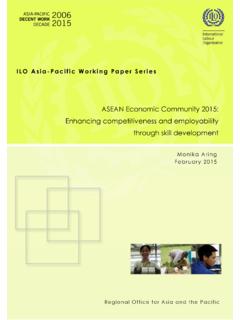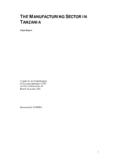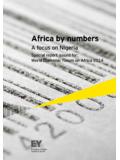Transcription of “Europa Quo Vadis ?“ The renaissance of european …
1 ScenarioScenarioThinkingThinkingasasthet heMainMainToolToolofofStrategicStrategic ThinkingThinkingin in thetheInformationInformationAgeAgeIvan Ivan KlinecKlinecInstitute Institute ofofEconomicEconomicResearchResearchSlov ak Academy of SciencesSlovak Academy of SciencesBratislavaBratislavaEE--mailmail : : EuropaEuropaQuoQuoVadisVadis? ? , 19th, 20201111 ScenarioScenarioThinkingThinkingin in thetheInformationInformationAgeAge Scenario thinking is strategic thinking forthe information age One scenario strategies of industrial ageare substituted by multiply alternativescenario strategies Emergence of scenario thinking has sametiming as emergence of information ageScenarioScenarioThinkingThinkingin in thetheInformationInformationAgeAge Emergence of scenario thinking isresponse to growing uncertaity ofemerging information age Scenarios are about freedom and choices Scenarios are about choices of future and presentStrategic ThinkingStrategic Thinking Industrial Age Forecasting Technological Forecasting Prognosing Trend Extrapolation Modelling Strategic Planning Strategic Analysis information Age
2 Scenario Thinking Scenario Writing Scenario Planning Scenario Designing Long View Mental Maps Wild Cards Assumption Based Planning War Gaming Learning Organization Robust Strategies Puzzle ParadigmScenario ThinkersScenario Thinkers Herman Kahn Pierre Wack Gill Ringland Miriam Galt Jerome Glenn Theodore Gordon Liam Fahey Robert Randall Chantel Ilbury Clem Sunter Diana Scearce John Petersen Peter Schwartz James Ogilvy Lawrence Wilkinson Napier Collyns Art Kleiner Kees van der Heijden Adam Kahane Ged Davis Michel Godet Andrew Marshall Katherine Fulton Max MoreSStrategictrategicThinkersThinkers Herman Kahn Ossip Flechtheim Buckminster Fuller Daniel Bell Yoneji Masuda Alvin Toffler John Naisbitt Pierre Wack Peter Schwartz James Ogilvy Arie de Geus John Petersen Jerome Glenn Peter Senge Napier Collyns Lawrence Wilkinson Art Kleiner Stewart Brand Andrew Marshall Arthur Cebrowski John Garstka Thomas BarnettScenario Thinking Scenario Thinking OrganizationsOrganizations RAND Corporation Hudson Institute SRI International Royal / Dutch Shell Batelle Global Business Network Arlington Institute World EconomicForum CIA - NIC Millennium Project of AC/UNU Net Assessment Office DoD Club of Rome Global ScenarioGroup Chatham House IDON RAND PardeeCenterScenario Thinking BibliographyScenario Thinking Bibliography Herman Kahn: On Thermonuclear War.
3 1962 Herman Kahn: Thinking about the Unthinkable. 1962 Herman Kahn: On Escalation. Metaphors and Scenarios. 1965 Herman Kahn, Anthony Wiener: The Year 2000. A Framework for Speculation on the Next Thirty-Three Years. 1967 Daniel Bell: The Coming of Postindustrial Society. 1973 Donald Michael: On Learning to Plan and Planningto Learn. 1973 Scenario Thinking BibliographyScenario Thinking Bibliography Pierre Wack: Scenarios: The Gentle Art of Reperceiving. 1984 Pierre Wack: Scenarios: Shooting the Rapids. Harvard Business Review. 1985 Pierre Wack: Scenarios: Uncharted Waters Ahead. Harvard Business Review. 1985 Peter Schwartz: The Art of Long View. Planning for the Future in an Uncertain World. 1991 Wired. Scenarios Special Edition. October 1995 Lawrence Wilkinson: How to Build Scenarios ?
4 1995 Scenario Thinking BibliographyScenario Thinking Bibliography Kees van der Heijden: Scenario. The Art of Strategic Conversation. 1996 Art Kleiner: The Age of Heretics. Heroes, Outlaws, and the Forerunners of Corporate Kees van der Heijden, Ron Bradfield, George Burt, George Cairns, George Wright: The Sixth Sense. Accelerating Organizational Learning with Scenarios. 2002 Eamonn Kelly, Peter Leyden and Members of Global Business Network: What s Next? Exploring the New Terrain for Business. 2002 Scenario Thinking BibliographyScenario Thinking Bibliography Arie de Geus: Planning as Learning. 1988 Peter Senge: The Fifth Discipline. The Art and Practice of the Learning Organization. 1990 Arie de Geus: The Living Company. 1997 Miriam Galt et al.: Idon Scenario Thinking.
5 Howto Navigate Uncertainty of Unknown Future. 1997 Liam Fahey, Robert Randall: Learning from theFuture. Competitive Foresight ScenariosAdvantage Through Scenario Planning. 1998 Gill, Ringland: Scenario Planning. Managing forthe Thinking BibliographyScenario Thinking Bibliography John Petersen: Out of the Blue. How to Anticipate WildCards and Big Future Surprises. 1999 Michel Godet: Creating Futures. Scenario Planning as a Strategic Management Tool. 2001 Chantell Ilbury, Clem Sunter: Mind of a Fox. Scenario Planning in Action. 2001 James Ogilvy: Building Better Futures. Scenario Planning as a Tool for a Better Tomorrow. 2002 Peter Schwartz: Inevitable Surprises. Thinking Ahead in a Time of Turbulence. 2003 Rober Lempert, Steven Popper, Steven Bankes: Shapingthe Next One Hudred Years.
6 2003 Diana Scearce, Katherine Fulton: What If ? The Art ofScenario Thinking for Nonprofits. 2004 Jerome Glenn, Theodore Gordon: Future ResearchMethodology , , , 1999, 2003, 2009 MilestonesMilestonesofofScenarioScenario ThinkingThinking 1950 Herman Kahn started and developed scenariotechniques at RAND Corporation 1956 Emerging information society in United States 1960 Herman Kahn founded Hudson Institute 1960 Several Herman Kahn s books on scenario thinking 1970 Warning scenarios of Club of Rome 1970-1980 Developing scenario thinking and scenarioplanning at Royal / Dutch Shell 1984 Pierre Wack s articles on scenario planning 1987 Foundation of Global Business Network by Peter Schwartz, Jay Ogilvy, Napier Collyns, Stewart Brand and Lawrence Wilkinson 1990 Emerging World Wide WebMilestonesMilestonesofofScenarioScena rioThinkingThinking 1995 Wired Magazine Scenarios Special Edition 1997 The Millennium Project of AC/UNU started 1997 State of the Future reports published every year 1999 Future Research Methods edited by JeromeGlenn 1999 Out of the Blue - How to Anticipate Wild Cards and Big Future Surprises by John Petersen 2003 Future Research Methods by Jerome Glenn and Theodore Gordon 2004 Pentagon s 2020 warning scenario by Peter Schwartz and Doug Randall 2009 Future Research Methodology Version by Jerome Glenn and Theodore Gordon 2010 Global Governance 2025 scenarios by NIC - CIAWhat Are ScenariosWhat Are Scenarios Scenarios are stories Scenarios are maps
7 Of the future Scenarios are mental maps Scenarios are mental models Scenarios are narratives Scenarios are pictures Scenarios are models Scenarios are sets of indicators Scenarios are tools Scenarios are artWhat Are ScenariosWhat Are Scenarios Scenarios are the powerful vehicles for challenging our mental models about the world. Peter Schwartz Scenarios are a tool for helping us to take a long view in a world of great uncertainty. Peter Schwartz Scenarios are stories about the way the world might turn out tomorrow, stories that can help us recognize and adapt to changing aspects of our present environment. Peter SchwartzWhat Are ScenariosWhat Are Scenarios Scenarios are attempts to describe in somedetail a hypotethical sequence of events thatcould lead plausibly to the situation envisaged.
8 Herman Kahn Scenario is a tool for ordering one sperceptions about alternative futureenvironments in which one s decisions mightbe playede out. Peter Schwartz Scenario is a set of organized ways for us to dream effectively about our future. Peter SchwartzWhat What IsIsScenarioScenarioPlanningPlanning Scenario planning is about making choicestoday with an understanding of how theymight turn out. Peter Schwartz Scenarios liberated planning from thetraditional predict and control approach. They are not accurate forecasts, they are, as Kahn said, thinking tools. Kees van der HeijdenSteps to Developing ScenariosSteps to Developing ScenariosPeter Schwartz s MethodPeter Schwartz s Method Step One: Identify Focal Issue or Decision Step Two: Key Forces in the Local Environment Step Three: Driving Forces Step Four: Rank by Importance and Uncertainty Step Five: Selecting Scenario Logic Step Six: Fleshing Out the Scenarios Step Seven: Implication Step Eight: Selection of Leading Indicators and Signposts Peter Schwartz: The Art of Long ViewScenarioScenarioThinkingThinking 5 5 PhasesPhasesAccordingAccordingto Diana to Diana ScearceScearceand and KatherineKatherineFultonFulton Phase One: Orient Interviews, FocalIssues Phase Two: Explore - CriticalUncertainties, Predetermined Element Phase Three.
9 Synthesize ScenarioFramework, Scenarios Phase Four: Act Implications, StrategicAgenda Phase Five: Monitor Leading Indicators, Monitoring SystemEuropeEurope20203636 IINNDDUUSSTTRRIIAALLSSOOCCIIEETTYYIINNFF OORRMMAATTIIOONNSSOOCCIIEETTYYN ationNationStateStateMarketMarketStateSt ateSuperpowerSuperpowerEuropeEuropeEurop eEuropeofofAlliancesAlliancesEuropeEurop eofofConflictsConflictsPuzzlePuzzleEurop eEuropeEuropeEurope20362036 Wild Card ScenariosWild Card Scenarios Economic Conflict with USA Economic Conflict with China War Conflict within european Union War Conflict with Russia War Conflict with Islamic Countries War Conflict with Countries of North Africa Civic War within Region of EU Permanent Economic Crisis Collaps of Eurozone Dezintegration of european Union Big Terrorist Attack on the Territory of EU Local Arm Conflict Ecological Disaster Collaps of Basic Infrastructure World or
10 european Pandemy Natural DisasterEuropeEurope2036 2036 Driving ForcesDriving Forces information Technology Internet information Knowledge Education Science information Capital Knowledge Capital Networking Digital Economy Communication Spirituality Art Culture Health Diversity Emerging Markets Social Capital Sustainability information Economy Network Economy New EconomyEuropeEurope20362036 ScenarioScenarioEuropeEuropeofofAlliance sAlliances Driving Forces:Industrial Policymakers plus Market Political System:Aliances of National States, National Governments, National Sovereignties, Parliament Democracy, Dictatorships, Partisan System, Corruption International System:Aliancies of National States as International Players Economy:Second Wave Industrial Economy, New Economy of InformationSociety in Selected Countries Security: european Security System, Security Aliances Defense:National armies, Defense Alliances Priorities:Second Wave Industries Currency:National Currencies Competitiveness:Partialy Internet:According to Economic Performance Social Capital:Decrease Demography:Decrease, Ageing Organization:Industrial Hierarchies, Crime and Shadow Economy Networks Society:Second Wave Industrial Society, information Society in SelectedCountries, Tribalism Culture:Industrial UnificationEuropeEurope20362036 Scenario Scenario SuperpowerSuperpowerEuropeEurope((United UnitedStatesStatesofofEuropeEurope)) Driving Forces: information Technology plus Market Political System.










